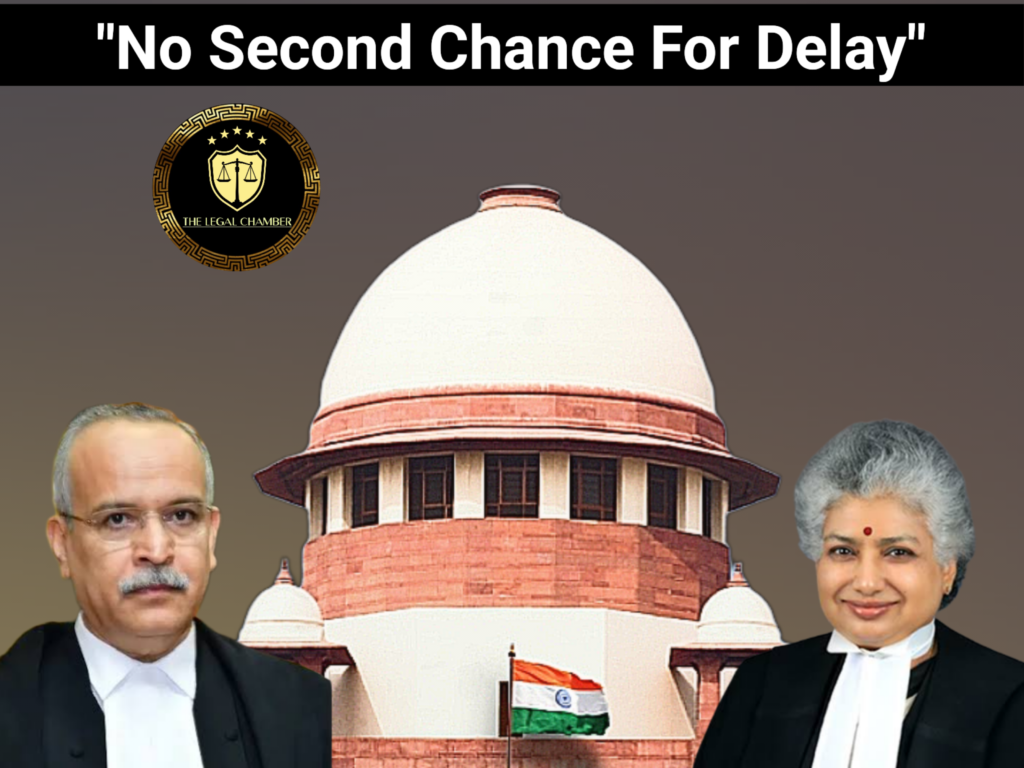
The Supreme Court ruled that repeated applications for condonation of delay under different procedural provisions (Order IX Rule 13 and Order XLI Rule 3A CPC) cannot be entertained when the same grounds were already rejected in earlier rounds. Emphasizing strict adherence to limitation laws, the Court held that finality of judicial orders must prevail over belated challenges, and litigants cannot abuse process by re-agitating identical delay explanations. The judgment reaffirmed that Section 14 of the Limitation Act doesn’t apply where prior delay condonation pleas were dismissed on merits.
Facts Of The Case:
The dispute arose from a 2015 sale agreement between the appellant (Thirunagalingam) and respondent No. 1 (Lingeswaran) concerning property in Nainarkoil village. When the respondent failed to execute the sale deed, the appellant filed a civil suit (O.S. No. 110/2015) for specific performance. During the suit’s pendency, respondent No. 1 sold the property to respondent No. 2 via a registered deed dated 26.11.2015. The respondents initially participated in the suit by filing written statements but later stopped appearing, leading the trial court to pass an ex-parte decree on 07.02.2017. The appellant initiated execution proceedings, resulting in the sale deed being executed in his favor.
The respondents then filed applications under Order IX Rule 13 CPC to set aside the ex-parte decree, citing delays of 712 and 467 days, which the trial court initially allowed but were later overturned by the High Court and affirmed by the Supreme Court in SLP Nos. 2054-55/2022. Subsequently, the respondents filed a fresh appeal with a 1116-day delay condonation plea before the first appellate court, which was dismissed but later allowed by the High Court subject to ₹1 lakh costs. The Supreme Court ultimately set aside the High Court’s order, holding that the respondents could not re-agitate the same delay grounds already rejected in prior proceedings.
Procedural History:
The case originated with a civil suit (O.S. No. 110/2015) filed in 2015 before the Sub-Court, Paramakudi, seeking specific performance of a sale agreement. After an ex-parte decree was passed on 07.02.2017, the respondents first challenged it through delay condonation applications (I.A. Nos. 119/2018 and 462/2018) under Order IX Rule 13 CPC, which the trial court allowed but the High Court reversed in CRP(MD) Nos. 1688-1689/2019. The Supreme Court affirmed this dismissal via SLP(C) Nos. 2054-2055/2022 on 25.02.2022. In a second attempt, the respondents filed a belated first appeal with a 1116-day delay condonation plea (I.A. No. 1/2022), which the Principal District Judge dismissed on 08.02.2023. The High Court then condoned this delay in CRP(MD) No. 1113/2023 on 25.04.2023, imposing ₹1 lakh costs. The Supreme Court, in its final judgment dated 13.05.2025 (Civil Appeal arising from SLP(C) No. 17575/2023), set aside the High Court’s order, ruling that the respondents’ repetitive delay petitions – though under different procedural provisions (Order IX Rule 13 and Order XLI Rule 3A CPC) – constituted an abuse of process since the same grounds had already been rejected in earlier rounds. The procedural journey thus saw three tiers of litigation over delay condonation, with the Supreme Court ultimately upholding strict compliance with limitation laws.
Court Observation:
The Supreme Court made critical observations while delivering its judgment. It emphasized that limitation laws must be applied strictly, noting that repeated attempts to condone delay under different procedural provisions (Order IX Rule 13 and Order XLI Rule 3A CPC) for identical grounds constitute an abuse of judicial process. The Court observed that once a delay condonation plea has been rejected on merits in earlier proceedings, litigants cannot resurrect the same explanation through alternative procedural routes. It distinguished the case from N. Mohan v. R. Madhu (2020), clarifying that the respondents here had actively participated in initial proceedings by filing written statements before abandoning the case, unlike in N. Mohan where summons went unserved. The Court underscored that judicial finality would be undermined if parties were permitted to endlessly re-litigate settled issues of delay. Significantly, it held that Section 14 of the Limitation Act (which excludes time spent in bona fide litigation) cannot rescue litigants who fail to provide fresh justifications for delay in subsequent applications. The judgment reaffirmed that courts must prioritize bona fides of delay explanations over merits of the main case when considering condonation pleas, and that equitable jurisdiction cannot override statutory limitation periods absent compelling reasons.
Final Decision & Judgement:
The Supreme Court allowed the appeal and set aside the High Court’s order dated 25.04.2023 which had condoned the 1116-day delay in filing the appeal. The Court restored the Principal District Judge’s order dated 08.02.2023 that had dismissed the delay condonation application (I.A. No. 1/2022). In its final judgment, the Court held that: (1) the respondents’ repetitive attempts to condone delay under different procedural provisions for identical grounds amounted to abuse of process; (2) the High Court erred in applying N. Mohan’s case as the respondents had actively participated in initial proceedings before abandoning the case; (3) Section 14 of Limitation Act couldn’t be invoked when prior delay condonation pleas were already rejected on merits; and (4) judicial finality must prevail over belated challenges. The Court directed that the ₹1 lakh costs deposited by respondents be returned to them, and all pending applications stood disposed. Justices B.V. Nagarathna and Satish Chandra Sharma pronounced the judgment on 13.05.2025, reinforcing that limitation periods cannot be circumvented through successive applications rehashing previously rejected explanations.
Case Details:
Case Title: Thirunagalingam vs. Lingeswaran & Anr. Citation: 2025 INSC 672 (Supreme Court of India) Special Leave Petition (Civil) No.: SLP (C) No. 17575 of 2023 Date of Judgment: May 13, 2025 Judges/Justice Name: Hon'ble Ms. Justice B.V. Nagarathna & Hon'ble Mr. Justice Satish Chandra Sharma
Download The Judgement Here